|
10/28/2021 0 Comments Hopeless cases and lost causes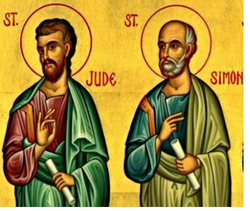 Today is the Feast Day of Saints Simon and Jude - of whom little is written within, or outside of the Bible. The end of the reading for today gave me pause. Jude ecourages those within the faith to, "have mercy on some who are wavering; save others by snatching them out of the fire; and have mercy on still others with fear, hating even the tunic defiled by their bodies." The first exhortation goes along with the book I have been reading with United Methodists in New England - Brian McLaren's Faith After Doubt. Doubting or wavering in one's faith, McLaren kindly observes, is not only highly prevelent in our present culture, it is a stage of faith. It is something we can pass through and come out stronger. In the Compassion Course taught by Thom Bond, we have just engaged with a less on on the "protective use of force." Snatching people "out of the fire" is a protective use of force. While many commentaries like to interpret the fire as eternal punishement for all time, I find it far more helpful to think of the present "fires" that torment us. The trick here is what to do about agency. When a toddler virges from the yard to a busy street, we wouldn't hesitate to snatch them out and place them inside a fenced in place where they can be safe, and we who are supervising can have peace of mind. But other situations make it harder to decide when and how to use protective force. I have an addiction to sugar and flour. Yesterday I had not planned out our supper before the end of the day and found myself with my daughter in the store picking out food that had both - orange chicken, spring rolls and a tub of gingersnaps. My actions of buying, heating up and serving these foods to myself and my children are keeping us bound to these addictive substances. They do damage to our bodies and reinforce the addictive habit tracks in our brains. While this might not seem to be "fire" I know that continuing these actions is keeping me bound to practices that can lead to early dementia, diabetes and many other health problems. But right now, if a friend or family member tried to use protective use of force it very likely would backfire. Likewise, it is questionable if protective use of force really works with other addictions. It certainly backfired with Prohibition. How might we use protective force to protect people from fentanyl? Addictions require one's agency as a key ingredient to salvation. The last admonition is the most troubling to me. How am I to relate to some people with mercy and fear together? And is it really their bodies which defile their clothing? How does that measure up with my belief that every human being is made in the image of God, and is of sacred worth? Isn't it our clothing, our habits that belong to the practices of the wrath, that defile us? I need to do some more word study - the little exploration I made with my limited understanding of Greek indicates that there may be other ways understand what Jude is telling us. Here is a prayer for today by Br. Daniel Benedict: God of all hopeless cases and lost causes, as we commemorate Simon and, jude, cause us to trust you in all that overwhelms with all that risks obscurity, for all the disregarded. Amen.
0 Comments
10/18/2021 0 Comments A Week of Retreat: Part 1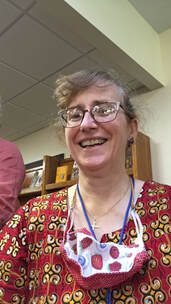 On Thursday October 14 I was at St. Paul of the Cross Monastery here in Pittsburgh wrapping up a four-day annual retreat of our dispersed Order of Saint Luke. This one was extra special for us because it was the 75th anniversary of OSL, and the first one we could have together since the COVID pandemic began. Over 50 Members came from across the US, and Br. Scot offered his services to transmit worship and presentations through the internet. The speakers included Brother Don Sailers (Indigo Girl Emily Sailers’ Dad!) from Candler School of Theology at Emory University, Brother Mark Stamm from Perkins School of Theology at Southern Methodist University and Sister Kimberly Greway, the prior of my local Chapter (named for Br. Hoyt Hickman), who has just completed ten years of working as chaplain at the Pittsburgh jail, and a doctorate about her work with incarcerated people. Br. Mark has become OSL’s chief historian and presented our history, noting some very intriguing questions that are drawing me to help gather more oral history. Br. Don presented some of his reflections as he has been working on a book about lament and praise in the Psalms. Sr. Kimberly revealed to us the hidden truth that most of the New Testament was written about, and often by people who had been incarcerated. She invited us to use that to think and act differently about the place of prison ministry in OSL, the Church and the world. This retreat was extra special for me because at our last worship service together on Thursday morning I professed the vows of OSL for life, along with my very dear friend from my years in Greater Boston, Sr. Cherlyn, and two other siblings I have come to treasure. Br. Brendan (Dwight) Vogel tied a knot in the new red cincture I purchased for this occasion and Br. David of the Hickman Chapter surprised me with my very own OSL scapular. As this was such a significant retreat I decided not to commute from home as I had done the past two times. Instead, I slept in a monastic cell, ate each meal with my siblings, was present for all the morning, midday, evening prayer and compline services and helped support my husband through a small crisis via my phone. I am so grateful to Joe for organizing his life and work to tend to Grace and Salem for a whole week! While on retreat, existing friendships were strengthened and new ones were forged (one is silver and the other is gold). After the service of profession of vows and lunch I had the privilege to transport Br. Don and Br. Mark to the airport, park my car and begin my own journey to Hartford. In the process I failed to transport a third sibling – one of my new friends – and didn’t even realize it until well after we had bumped into each other in a terminal, and some other siblings at my terminal whose gentle inquiry of whether I had seen him eventually jogged my memory. I quietly sat in a flood of shame that I had failed to engrave the promise I made to Br. David a few minutes before taking the life vows upon my heart. Please forgive me Brother David. I’m so glad Divine Providence took care of you when I did not. 4/10/2021 0 Comments Renounce the wrath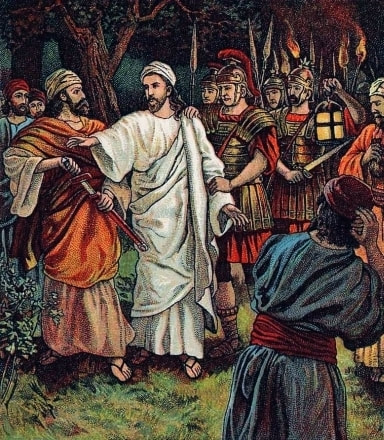 I start the Baptismal Tai Chi facing the world. Christ is at my back. I may not even be aware that Christ is looking at the world with me. I am focused on how the world is impacting me and others. With strength in my arms, I plant my feet, step one leg forward, and fiercely push away. I renounce the wrath. What am I renouncing? What do I push back against with all my might? I call it the wrath. The wrath is the culture that surrounds us, and shapes us by using violent force to make people do things. The ways of wrath benefit the few, the powerful, the privileged yet do great harm to everyone in society. The wrath makes judgements to justify its violence – they are evil, or I am bad – condemnation and enemy images are marks of the wrath. In the Roman and religious culture of Jesus the wrath condemned him the cross; emotional violence as well as physical. The wrath also employs rules and bureaucracy to control the masses. It even uses the promise of rewards if you just work hard enough, just make yourself fit in, you will be on top, like an emperor. The results of living in the wrath include fear and anxiety, which can lead to telling lies, isolation and hiding; all to protect us from likely violence. When we inflict the wrath on ourselves we can become depressed; we find temporary ways to treat the pain of the wrath and become addicted. We also naturally inflict the wrath on others, our children, or coworkers, our spouses; abusing them physically and emotionally. In a culture of wrath, we have a lot of enemies. It is a culture of war. The Church is no stranger to the wrath – it is embedded in us. Even in many baptismal covenants enemy images are imbedded when people are asked to “renounce the spiritual forces of wickedness.” Terms such as wicked, heathen, pagan, infidels, were used to signify the other; an enemy worthy of violence. In more modern times Christians have called other peoples “primitive” to justify colonization, taking resources. The Church, in its wrath, turned Christ into a Judge with heaven as the reward for compliance and eternal hell as the ultimate punishment. And the Church has supported hell on earth through the crusades, slavery and lynching of the “others,” of burning people at the stake, or hanging them for being witches. The Church has promoted clericalism – the idea that clergy are closer to God than others, and theologies such as predestination lead us to live as if this wrath is just the way God ordained it. The truth of the Paschal Mystery – Christ’s life, death and resurrection – is that God means for us to be set free from the Wrath. This is the true image of salvation and atonement. Christ smashes through the gates of hell, destroys the lock and throws away the keys, reaching for our hands – every human’s hand – to pull us out of the wrath and into the circle of Shalom. So today we renounce the wrath. We say “no” - one of the first words young children learn, and use with determination. Every human being pushes against the wrath in one way or another because the wrath brings only death – and God means for us to live. When the King of Egypt instructed Shiphrah and Puah, the Hebrew midwives, to kill all baby boys, they renounced him, and let the boys live. When Pharaoh then commanded that the Hebrew boys be thrown into the Nile, three more women renounced him. Moses’ mother crafted a snug little boat, his sister Miriam watched over him and the Pharaoh’s own daughter adopted Moses, employing his mother as a nurse. These women all renounced the evil powers of the empire. When Daniel, a Jew in Babylonian captivity, was elevated to a government position by King Darius, other officials were jealous. They used the reward of flattery to convince Darius to enact a law that the people were to worship no other god but him for 30 days. Daniel quietly continued to worship Adonai, was arrested and thrown into a lion’s den. He renounced the evil powers of the empire that were tempting him to be unfaithful. When Mary said “yes” to being a God bearer, carrying Christ in her womb, she sang to Elizabeth her hope that through Christ the proud would be scattered and the mighty would come off their thrones while the lowly would be lifted up. Jesus Renounced the wrath through his work of healing, connecting with those on the margins of society and in his teachings – such as the sermon on the Mount. He offered a way of salvation open to all people. When Jesus Christ recognized that the Good News he was preaching threatened both the religious and government officials he nevertheless set his face to the capital city of Jerusalem. Renouncing the threat to his own life, Jesus persisted in his mission. During his arrest, when one of Jesus’ disciple attacked with a sword, Jesus renounced the evil power of violent force seeping into his friends. He asked this enraged disciple to put his sword back, and Jesus healed the wounded ear of the enemy’s slave. From the cross Jesus renounced the enemy images, offering forgiveness to those who were unawake to the realities of the wrath and the circle of shalom. Renouncing the wrath is a beginning step in the journey from wrath to shalom. Prayer: O holy God, in whom we live and move and have our being. We thank you for revealing to us the wrath all around us and your alternative of life in shalom. Today we renounce the wrath, that is not from you. We renounce power when it is used to make us anyone do anything against their free will. We renounce fear created by threats of physical abuse even to the point of death. We renounce fist fights, hazing, reckless dares, muggings, and domestic violence. We renounce pedophilia and human trafficking. We renounce slavery and imprisonment. We renounce waterboarding and capital punishment. We renounce arms races and war. We renounce the demonization of any culture or people for the purpose of justifying violent oppression, invasion, environmental damage to and theft of natural resources. The powers we renounce are systemic, used by governments and corporations, adopted by schools and families. Thank you for showing us that the force we push against is not only physical, but mental, emotional and spiritual. We renounce peer pressure and bullying that employ shame for wearing the wrong clothing, loving the wrong person or having the wrong hair or skin color, or the wrong ancestry. We renounce clericalism and elite societies that envision themselves on higher rungs – closer to god. We renounce advertisements that induce fear through the emphasis of lack, “hurry, while supplies last!” We renounce humiliation for trumped up charges such as dandruff, yellow teeth and halitosis. We renounce spending my time and money on altering my body so that we will fit in with society. We renounce prejudice against those who speak other languages, speak English with an accent or a dialect, and those who prefer to speak in sign language. We renounce forces that would make people ashamed of their bodies, each fearfully and wonderfully made. We renounce the forces which usher people to the place of depression, isolation and addiction where there is weeping and gnashing of teeth. We renounce rewards for “good behavior,” another a strategy of violent force. These rewards come in the form of good grades in school, promotions at work, popularity, winners. These rewards and ladders are brutal, for they promise that with enough hard work anyone can move on up. Yet the vast majority encounter bell curves, glass ceilings, redlining, poverty, and staggering debt. These and other such forces beyond our control keep us down. The system is rigged. But when we keep believing that each individual can pull themselves up by their boot straps, and our failings are our fault, we struggle and fall exhausted into depression. The reward and punishment of being allowed to "fit in" with a group, or be shunned can keep us captive. The church’s favorite way of using this system of rewards and punishments is by promising heaven and threatening hell. We renounce this way of judging the world and the images of a god of wrath whose aim is to condemn many to eternal fire. Thank you, Jesus, for the power and freedom to say “No!” to the wrath. You have shown us that the strongest, most inspiring resistance takes place in spite of the threat of death, while rejecting the temptation to engage in violence ourselves. When we learn this truth, and practice renouncing, rejecting and resisting violent force, we find freedom to do only those things that bring life and joy to our lives. Amen.  Jesus Christ “has come to judge the quick and the dead.” The Apostle’s Creed I have a beloved colleague from Africa who served mostly white congregations in New England for a couple of decades. One Sunday morning she led a joyful song that was made to move one’s whole body in worship with clapping and dancing, or at least toe tapping. In the midst of a verse she looked out at the members of her beloved congregation and saw that they were still. She stopped singing and said in amazement, “I see dead people.” There was a lot of love between her and them, and so this brought forth some laughter, even years later. Yet this episode leads us to wonder: when are we walking around mostly dead and when are we fully alive? The King James’ version of the Apostle’s Creed uses the word “quick” for alive. This elicits not only speed, like our heartbeat after jogging, but also our core presence, the very center where life resides. When I thought of Jesus judging the quick and the dead as a girl, I imagined him judging the sheep and the goats – deeming that some should live and some deserve to die. But I see things quite differently now. What if this judgement of Jesus is not making a decision, but the ability to see what is already going on in our lives? What if Jesus looks at many of us in our day to day lives, in what we do and fail to do, and often sees that we are “dead people.” What can keep those of us on this side of the grave from living fully? What can keep us isolated, depressed or bound to addictive consumption? Here are some of gate keepers of my own living tomb:
I believe such feelings are actually combined with thoughts. For a long while I couldn’t imagine living to adulthood because of my anxieties about the Cold War. I didn’t enjoy gym class or going to dances because I my body didn’t do what I thought it “should” do. I can be zealous against the grocer who mindlessly puts my meat in a plastic bag when I brought my own cloth bags to help save our planet. I can see now how my inhibitory emotions developed during childhood in response to early traumatic experiences. When I get caught up in these feelings, they tend to keep me from feeling deeper emotions such as joy, sadness, wonder, fear, frustration, contentment and excitement. They keep me detached from my core, and disconnected from others. Becoming awake to these forces within me helps me to do something about it. It is a gift of Jesus that he comes to help me discern between truly living and premature death. Jesus came to set us free from shame, guilt and the fear of death. He is ready to melt our angry hearts of stone. He offers so many means of grace to set us free to truly live. How have anxiety, shame, guilt and anger kept you from fully living? What has kept you isolated, depressed and addicted? What activities help you to get free? One practice that has helped me through life is called Devotions in Motion. I’ve posted a few on this website under the Christ Centered Practices tab. Don’t worry – they aren’t all particularly “religious.” I’ll invite you to walk like penguins, and bears, and dance like a rag doll. 11/4/2020 1 Comment On the Inside; On the Outside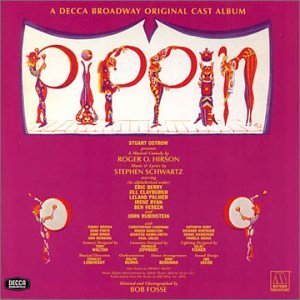 Click to listen to Corner of the Sky Click to listen to Corner of the Sky “There is therefore now no condemnation.” Romans 8:1 My parents built my childhood home in a rural area with a good school, where the land was in expensive and there were no housing tracts. Our neighborhood was surrounded by dairy farms and many of our neighbors had been in the area for several generations. When I was in 5th grade my parents decided to change churches, from the one in the nearby village, to one squarely in the suburbs of Syracuse. The other adults welcomed us warmly, but my peers weren’t too sure. One time someone made a dig that the kids in my school district had to wipe the cow dung off of their boots before entering the school. The irony was that I didn’t fit in all that well with the kids in my community because our family was not from there and my dad was not a member of the volunteer fire department. When our school chorus sang Corner of the Sky from Pippin I belted out “Why do I feel I don’t fit in anywhere I go?” with feeling. When I went to college I encountered a lot more diversity among the student body and faculty. Many of the political views I had been raised with were much more the norm than they were at home. The few people there with conservative views and lifestyles found it hard to fit in. I was clearly an odd one for getting up each Sunday and going to church before brunch. Like a vine growing on a trellis, those four years of college and another four living and working in that community bent my thoughts and actions toward the left. I came to realize that I felt lopsided the day I discovered that my father was a registered Republican and I cried. Already sensing my call to ministry I decided that I wanted a seminary that could bend and shape me in a different direction. It’s one thing to have an identity and ideology that helps you know who you are and what you stand for, guiding your actions. It’s another thing all together when that identity is so strongly binary that it makes the other automatically an enemy. If we judge those who vote differently than we as “utterly disgusting” or “stupid,” if driving through neighborhoods with many signs for the opposing party seems like we are in “enemy territory,” then we are cutting ourselves off from the very connection that is required for any true change. I appreciate my friend who observed that when we “demonize” voters for the opposing party, those people often as not “withdraw from the conversation, double down on their opinions, and don’t admit them as openly.” We end up talking at one another rather than listening to one another. When have you found yourself on the outside because of assumptions someone makes about who you are? When have you dismissed someone close to you as evil, disgusting or stupid, thus damaging your relationship with that person? 11/3/2020 0 Comments Kairos - Sacred Time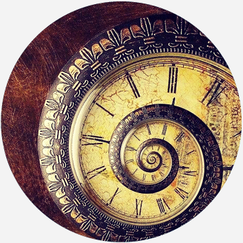 And I was walking down the street one day Being pushed and shoved by people Trying to beat the clock, oh, no I just don't know I don't know, I don't know, oh And I said, yes I said Does anybody really know what time it is Does anybody really care If so I can't imagine why We've all got time enough to die Chicago When it comes to time we usually think about clocks and calendars, birthdays and deadlines. All these tools help us to measure chronos - the Greek word for linear time.
Kairos is a second word to describe time. Think about when you read a great book, or get caught up in a wonderful move, or spend an hour in conversation with a best friend. When you come out of such an experience you recognize that you have no idea how long it lasted. These experiences show us that not every second holds the same worth. When Jesus proclaims “The time is fulfilled, and the kingdom of God has come near; repent, and believe in the good news,” he uses the word kairos. Similarly when Paul preaches, “Repent therefore, and turn to God so that your sins may be wiped out, so that times of refreshing may come from the presence of the Lord, “he is speaking about kairos. The word kairos is also used here: “Besides this, you know what time it is, how it is now the moment for you to wake from sleep. For salvation is nearer to us now than when we became believers; the night is far gone, the day is near.” This is the experience of God’s time and it is not confined or linear like chronos. When we enter into kairos past, present and future collapse into one eternal moment. Thus the Bible proclaims that we don’t need to wait until we die to enter into heaven, to know an abundant life of shalom. We can know it here and now. The very best worship services usher those in the sanctuary into a time of kairos. When we proclaim the mystery of faith, “Christ has died, Christ is risen, Christ will come again,” we are describing the kairos moment of being in Christ’s eternal presence. Kairos is the time of the circle, where we have no regrets about the past for Christ has redeemed the past, and no fear of the future because Christ is there making all well. We can relax and be truly present to our merciful, gracious, loving God who is really present with us. Emmanuel. Madeline L’Engle wrote, Kairos. Real time. God’s time. That time which breaks through chronos with a shock of joy, that time we do not recognize while we are experiencing it, but only afterwards, because kairos has nothing to do with chronological time, In kairos we are completely unselfconscious, and yet paradoxically far more real that we can ever be when we are constantly checking our watches for chronological time. The saint in contemplation, lost to self in the mind of God is in kairos. The artist at work is in kairos. The child at play, totally thrown outside himself in the game, be it building a sand castle or making a daisy chain, is in kairos. In kairos we become what we are called to be as human beings, co-creators with God, touching on the wonder of creation. This calling should not be limited to artists - or saints. - from Walking on Water Another way of translating kairos is “eternity.” Rabbi Abraham Joshua Heschel writes that Sabbath and eternity are one. “The idea that a seventh part of our lives may be experienced as paradise is a scandal to the pagans and a revelation to [us].” There was a time when Protestants attempted to follow laws about keeping the Sabbath on Sunday. The day was set aside to be in God’s presence through worship, reading of scripture, meals with family and friends and holy conversation. It is a day of no work was set apart by God to be, to look, and listen, to breathe, to walk through the woods or gaze at the stars. It is a day to delight in creation, to play like a little child, to love and be loved. These are kairos moments - heaven breaking into our world. The method of Methodism was designed to usher people into God’s eternal presence, to foster their Christian experience of God’s grace and mercy now. Early Methodists gathering for worship at quarterly conferences and at camp meetings saw themselves as living in the kingdom of heaven on earth here and now - God’s answer to the Lord’s Prayer. Questions: Have you experienced kairos time? How did it impact you? Knowing that kairos experiences belong to life a life of shalom what might you change in your life to receive this means of God’s grace more often? 11/2/2020 The Kabba Woman from Massachusetts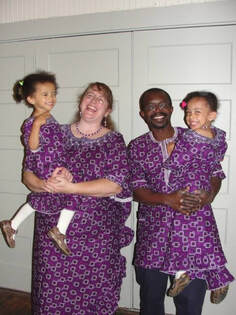 Click to listen to the Podcast Click to listen to the Podcast “I have become all things to all people... I do it all for the sake of the gospel, so that I may share in its blessings.” Paul, 1 Corinthians 9:22-23 I was 40 when I married Joseph Olajide Elewononi. As a girl I always assumed I would take the name of my spouse, and would doodle various combinations of my name and the ones who attracted my desire in my notebook. But by 40 I had lived with my original name for a long time and didn’t want to simply exchange Mount for Elewononi. Under other circumstances I might not have changed my name at all. Marrying an immigrant after 9/11 added a new consideration. One strategy for showing that I really meant this union was by changing my name. My Doctor Mother had simply added her spouses’ last name to hers, so I went ahead and did likewise, filling out all manner of forms to let people know I am now Sarah Jean Mount Elewononi. When our first child was on the way I asked my husband if he would like to give her an Owé first or middle name. He said Elewononi was enough for her to deal with in American culture. It takes patience and some humor to help others know how to spell and say our name. My favorite advice is to say Elewononi rhymes with elbow macaroni. After Grace was born Joe’s cousin Kola came to visit. We enjoyed showing him the sights of Boston and we were glad for his rich booming voice and hearty laugh interwoven with our conversations. One evening at supper Kola looked at me and declared me to be the “Kabba woman from Massachusetts.” Joe and Kola grew up in Kabba. As Joe was heading to Syracuse, New York, his father took him aside and said he was only to marry someone from Kabba. And sure enough, most of Joe’s siblings are married to other people from Kabba. But Joe’s adventures in America did not lead to encounters with many Africans at all, let alone Yoruba or people from Kabba. When Kola called me “Kabba woman from Massachusetts”, years after Joe’s father had died, I felt delighted and appreciative. I take it to mean that Kola sees in me some essential aspects of character that meet the family needs for connection, harmony and well-being. I belong. When has someone let you know you belong? When have you broken the rules for fitting in? How did that effect your relationships with yourself and others? What aspects of your identity transcend tribe, language or nation? 11/1/2020 Wealth is Not the Same as Money “For to all those who have, more will be given, and they will have an abundance; but from those who have nothing, even what they have will be taken away.” Jesus, Matthew 25:29 Recently, as Salem was preparing to give an “All About Me” speech to her class, we got to wondering what Elewononi means. I’m so thankful that I can reach Uncle Kola so easily via WhatsApp. He explained that in Owé Elewononi means “the one who has wealth is surrounded by many people.” He noted that when the British translated the name they chose the word “money” instead of wealth. Empires tend to measure wealth in terms of money, property, resources, gross national product. Believing that one needs to be surrounded by money to be successful can set people up for a life of hard work with little joy. But in the alternative culture of God’s realm abundance is meant to be shared. And that sharing includes laughter, music, stories, dance and compassion. The more we share our wealth with others, the more wealth accumulates. This understanding about wealth as opposed to money clarifies what Jesus meant by “those who have, more will be given, and they will have an abundance.” My mother’s parents knew about this kind of wealth. Dedicating their lives to the Methodist ministry during the Great Depression meant cold homes heated by wood that Grandpa had to chop down in between sermons and pastoral visits. It meant that he had to help his “city girl” prepare supper by killing and dressing the live chickens their congregation offered them instead of cash. Yet they knew joy of sharing a picnic together, camping and hiking through the natural beauty of state and county parks, laughing over board games and card games and snuggling together to read favorite stories out loud. They passed all this wealth on to their family. My husband describes holidays like Christmas with his family in Kabba. This was not a day of disposable trees surrounded by piles of gifts for everyone. What gave them great joy was simply being gathered with friends and family and celebrating life. Dr. Seuss shared the same wisdom in his classic tale “How the Grinch Stole Christmas.” Waking to find all their presents, decorations and every “roast beast” gone, the Whos still could, join hands and sing for joy. True wealth cannot be stolen. What wealth do you have? When have you gotten caught up in joyless activity for the sake of money? Which people surround your life? Are there people with whom you wish to share more of your wealth? |
AuthorSarah Mount Elewononi is an ordained Elder in the United Methodist Church. A member of the New England Annual Conference for over 20 years, Sarah now resides with her family in greater Pittsburgh. Sarah completed the requirements for her doctorate from Boston University on Christmas Eve 2014. She worked with Dr. Karen Westerfield Tucker and Dr. Nancy Ammerman to better understand worship and change - both how repeated acts of worship change us, and how and why worship changes whether we want it too or not, and why we can be resistant to that change. Her dissertation was focused on Methodist worship at New England camp meetings in the 19th Century. Sarah is a member of the North American Academy of Liturgy, the Order of St. Luke and the Girl Scouts. Currently she leads her daughters' Girl Scout troop and serves as a substitute teacher. She also teaches a variety of United Methodist Course of Study offerings in worship, theology and Biblical studies. Archives
October 2021
Categories |
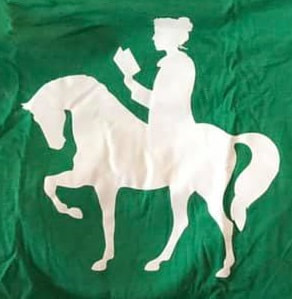
 RSS Feed
RSS Feed
